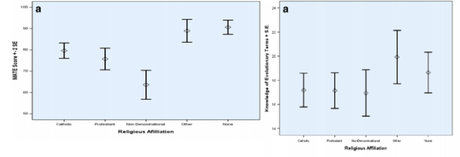Earlier this month Pope Francis caused something of a media storm by announcing to the world he believes in evolution. Quite why this counted as news I’m not sure, given that the Catholic Church has accepted evolution for decades. It’s not even a particularly controversial opinion amongst religious people. Whilst young-earth creationism may be a loud and problematic group they nevertheless represent a minority view (although barely). Most religious people are perfectly fine with evolution as an explanation for our planet’s biodiversity. But why do they agree with the scientific community when such a significant minority don’t?
One popular explanation is that it’s all to do with scientific knowledge. Acceptance of evolution is often correlated with education and scientific understanding. Thus it might be that some religious groups actively teach (or foster learning about) evolution; or at the very least don’t tell people to shy away from it. This leads to increased scientific understanding, which in turn explains the increased acceptance of evolution.
So some researchers decided to test this hypothesis by taking trip to the Milwaukee Public Museum. There they conducted a survey, identifying visitors’ knowledge of evolution, their acceptance of the theory and their religious denomination. The goal being to identify whether or not religious denomination was correlated with knowledge and acceptance of evolution; indicating that some groups were indeed fostering scientific understanding.
And as you might expect they found a link between knowledge and acceptance of evolution. People who knew more about the subject were more likely to believe it. They also found a correlation between religious denomination and acceptance of evolution. Catholics, for example, were about as likely as college graduates to accept the theory of evolution as true. Protestants had a similar rate of acceptance, whilst non-denominational Christians had a very low rate of belief in evolution.

Left: the acceptance of evolution of various religious denominations. Right: the knowledge of evolution of various religious denominations
Crucially though they failed to find a link between religious denomination and knowledge of evolution. A Catholic might have been as likely as a college graduate to accept evolution, but they typically knew less about the subject than a high school dropout. In other words, there were two paths people took to accepting evolution: they either knew something about the theory, or they belonged to a religion that said the theory was true.
This strongly suggests that the religious people who accept evolution tend to do so because of dogma. Because some authority figure – like the super pope – said its ok. They haven’t understood or evaluated the evidence, they’re just being obedient.
Reference
Barone, L. M., Petto, A. J., & Campbell, B. C. (2014). Predictors of evolution acceptance in a museum population. Evolution: Education and Outreach, 7(1), 23.

